~To Live and Die in Dixie~ *Doomsday* A History of the C.S.A.
- Thread starter unmerged(45168)
- Start date
-
We have updated our Community Code of Conduct. Please read through the new rules for the forum that are an integral part of Paradox Interactive’s User Agreement.
You are using an out of date browser. It may not display this or other websites correctly.
You should upgrade or use an alternative browser.
You should upgrade or use an alternative browser.
New Relations
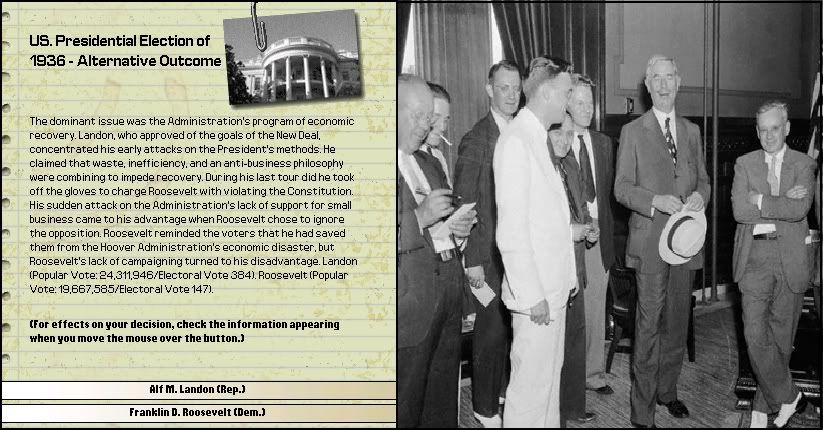

While Long’s attention was mainly focused on the conflict ensuing in Sonora and Chichuala, one of his more ’private’ interests began to slip away from him; The U.S. 1936 Presidential Election. Long and U.S. President Franklin Delano Roosevelt had began to become friendly aquatint’s over the course of the past few month, although they were a bit polar opposites.
While FDR didn’t agree with Long’s dictatorial tendencies, he accepted that they were effective and people seemed to love him none the less. Both FDR and Long shared a similar plan to bring their respected nations out of the depression and began to form a friendly bond, giving they both represented the Democratic Party (or in Longs case, Populace) in their country’s.
Due to ineffective campaigning and more, apparent, devotion by the competition the election turned in favor of the Republican candidate, Alfred Landon. Roosevelt’s defeat threatened to unbalance what Long hoped would be the birth of an American Alliance. While the U.S. and Confederacy remained on good term’s, Landon and Long’s ideology’s clashed, making further diplomatic deal’s harder to drive.
Meanwhile, the outbreak of violence in Sonora and Chichuala continued escalate. Rioters from both sides clashed in, what would be considered melee battles, in the streets of the cities. The situation began to spiral out of control as local law enforcements was unable to keep the violence from spreading while the local militia was hardly any more effective.
Finally, in late November 1937, the two state governors came to congress and declared the situation impossible to contain and asked for federal troops to be sent. Almost instantly Patton volunteered to take charge of the Army of Texas and what tanks he had to occupy the troubled area’s and put down the rebellion’s. Wasting no time he gathered the soldiers and marched into the states like a triumphing army, the tanks making up the center of a long column of thousands of cavalry soldiers.
This show of force and a declaration of ‘unofficial’ marshal law lead to Patton and his men containing the problem, setting up different sectors of the cities for both groups and creating a practical militarized zone between the two.
By the end of the month the state of emergency was finally lifted and order, to some degree, was established, allowing the military forces to begin decreasing their presence inside the residential area’s and spreading out to the border as precaution against possible attack.
Long later addressed the nation, forgiving the leaders of the ‘rebellion’, believing it was an act of desperation, but as a form of punishment they were all exiled from the mainland, this time to territory/potential state of Hawaii to work off their debt to the government as manual workers.
As the problems at home began to become less and less of a worry, aside from the possible threat of Mexican Invasion, Long became more and more interested in an external threat from across the sea. Back in January the German leader Adoff Hitler ordered the remilitarization of the Rhineland, a strategic strip of land to both France and Germany. His confidence in the ability of the League of Nation’s to put down any threat to the security of Europe, and the world, was shaken when they did nothing to halt the German advance. Long later said;
“Had the French had the gall to step in line when it mattered, instead of playing tag with the British, the threat of a new German rising would have been squashed without dragging the rest of the world into their squabble.”
*writers note* Eh, another short one, but they should be getting longer here when I get more time, enjoy!
Cool. Did the US event just happen to pop up Alternative Outcome, or did you guide it that way, to direct the storyline?
Brian Roastbeef said:Cool. Did the US event just happen to pop up Alternative Outcome, or did you guide it that way, to direct the storyline?
Nope, it really just happend like that. Its only happened in like two game's I have EVER played, so I don't know the precent chance of it happening but it must be small; I just loaded up as the U.S.A. and fired the event again when I decided to do an update on it then exited it out.
Interesting break then. Perhaps the people of the United States are looking at the uneasiness among their southern neighbors, and have decided to reaffirm their isolationism.
The Start
The action taken by Patton would have unforeseen and adverse affects on Confederate-Mexican relations. Mexican insurgents who were responsible for most of the violence, or at least inciting it, sent a flood of heavily edited photo’s flooding into the Mexican Empire depicting fake atrocities committed by Confederate soldiers.
A wave of outrage and protest swept through the Mexican public as these photo’s began appearing in local and national newspapers. Angry at the Confederacy for the mistreatment of their fellow man in the former Mexican province’s thousands took the streets. Major protests demanding some sort of action or reply from the Imperial government swept in from all corners of the empire, finally gathering in the ‘Imperial March’ through Mexico City. The protests had such a profound effect that Emperor Cellas himself came out and met the leaders of the protests and ordered a monument to be build in Mexico City to honor those fighting “For justice and freedom of the Mexican people” in the ‘occupied territory’.

[Propaganda photo showing Sonora Citizen’s being rounded up before being supposedly exiled to ‘work camps’ in Hawaii]
Cellas later came on the Mexican radio in his first major national address since the revolution, in which he condemned The Confederate States and their allies as criminal’s ageist humanity. Taking this time, he also berated the Cuban government, who Mexico considered to be traitors to their people for bowing to the will of a foreign power after gaining independence from the oppressive Spanish Empire.
For the first time in decades, all of Mexico seemed united completely behind one glorious leader, who seemed to be coming closer and closer to attempting to fulfill his vow to restore the Mexican Empire to its former glory. A series of Nationalistic Parades were thrown throughout the country, as well as a general assembly of soldiers in Mexico City under famous war hero General Hernandez Valdez, Mexico’s top general.
The parades and preparation’s lasted until February, 1937 when the C.S.A. received what the Mexican diplomat said was ‘the final ultimatum’, which was personally delivered to Long.
Generaly Long discounted Mexico as any real threat to Confederate safety, but none the less he issued a general warning to the nation and urged the nation to prepare for the worst possible outcome and to trust in the nation’s leaders to see them through the coming storm. General George Patton was authorized complete control over the C.S. Armored Corps and the troops in the immediate western half of the country while The Army of Northern Virginia and Kentucky were preparing for a possible sea invasion of the Yucatan Peninsula.
The nation held its breath all through the next month as they waited for Mexico to act. Long later recanted that it was perhaps one of the longest months in his life as he exhaustedly awaited for a reply, which finally came on March 18th, 1938.
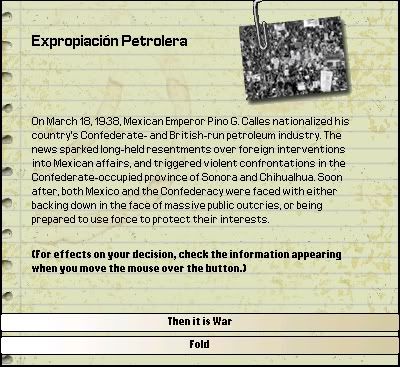
Emperor Cellas, now at the height of his popularity and power at the helm of the Mexican Empire expelled all Confederate and British business men(who he believed to be possible spy’s and saboteurs) who controlled the nations petroleum industry and effectively put it and most of the rest of the Empires resources in his and the Imperial Directory’s (a form of senate so to speak) hands.
Almost at exactly the same time as Cellas had them rounded up and sent away, more revolts and attacks irrupted through Sonora and Chichuala. The insurgents showed themselves in military esq. uniforms, waving the Imperial Mexican flag and openly attacking Confederate peacekeeping troops still left in the city.
Long would later address the nation, and Parliament at the same time asking for their full support and permission to engage the Mexican Empire in complete, and total war.
Ah ha! Crush the Mexicans!
Good AAR...a bit democracy intensive for me, but aye I'm only one reader
Good AAR...a bit democracy intensive for me, but aye I'm only one reader
Time for Mexico to take a fall.
A shame you decided to end the previous one. You had quite a story going there, but you also have a good tale going here.
A shame you decided to end the previous one. You had quite a story going there, but you also have a good tale going here.
fajita's all round!!!
enjoying this, really like the style. keep going.
later, caff
enjoying this, really like the style. keep going.
later, caff
Well, look at it as Patton getting an opportunity to train his men properly before they have to mess around in Europe. 
Contradiction said:Ah ha! Crush the Mexicans!
Good AAR...a bit democracy intensive for me, but aye I'm only one reader
glad your enjoying it
stnylan said:Time for Mexico to take a fall.
A shame you decided to end the previous one. You had quite a story going there, but you also have a good tale going here.
We'll see, I'm hoping they wont be too bad of a push over
Glad your enjoying this one as well; I find it hard to maintain an actual story, I just can't see to keep myself interested and come up with new material :wacko:
caffran said:fajita's all round!!!
enjoying this, really like the style. keep going.
later, caff
Thank You! I like the history book style alot myself.
Kurt_Steiner said:As it was foretold, so shall it be... Remember the Alamo!
lol, suppose it is about time I got to this point, unlike in the previous ones lol
*To all my posters and readers* Thanks for your continued support and I hope you are all enjoying! Update in progress
Beginning of War
Exert From Long’s War radio Address to Parliament and the Nation said:Ladies and Gentlemen of Parliament and the Nation. About 9:47 A.M. this mourning the Mexican government began expelling all British and Confederate citizen’s from their nation without warning or just cause. At 10:00 A.M. Mexican military personnel forcefully seized all British and our own petroleum industrial complex’s, placing them under the direct authority of the Emperor and the Imperial Directory.
These were just a few event’s that opened up this day, a day that will forever be etched into our minds as a day our nation stood strong in the face of foreign threat. Shortly following the seizure of our assets within the Mexican Empire the State Capital buildings in Sonora and Chichuala were simultaneously bombed by Mexican nationalists, killing several government workers, injuring hundreds and nearly killing the governors.
For the first time since the Spanish-Confederate War our nation suffered a direct assault on our soil, and a threat rising on the horizon that we can no longer pretend to ignore.
I’ve come before you today with a great burden, carrying with me the possible fate of thousands of our young boys. I ask that Parliament act quickly and decisively on this matter, that they should come to a conclusion that a state of war now exists between our great nation and the Imperialist Empire of Mexico….
Long delivered his War Radio Address the very day of the attack’s, wasting no time in approaching Parliament. Unlike any other previous war address, Long gave his live on radio, which was broadcast from the Parliament building to every radio in the nation. This plan was devised to rally unified support to him and the government, stating “White, Black or Hispanic, you are all Confederate citizen’s, all equally at risk..”
The decleration had a mixed international reaction. While the British supported the decison to go to war as vengence for the siezure of their assets, the United States under Alf Landon protested it. For a short while after the war's start their was a fear of U.S. intervention, given supposed reports of the U.S. Gearing up for potential war.
None the less, Parliament wasted no time in agreeing to a formal declaration of war against the Empire of Mexico, effectively giving Long 100% power over all aspects of the nation during war time, it was after all, what the office was there for. Despite the fact that Parliament was, basically, the ruling body during peacetime, Long had ordered the movement of military forces and personnel even before the attacks and expulsion of foreigners from Mexican lands, even going as far as preparing for air strikes against major Mexican Airports and fields.
This maneuver was a dangerous gamble, as it was all done without Parliaments permission, but his tight control over the C.S.S. prevented any information of his plan’s from leaking into Parliament.
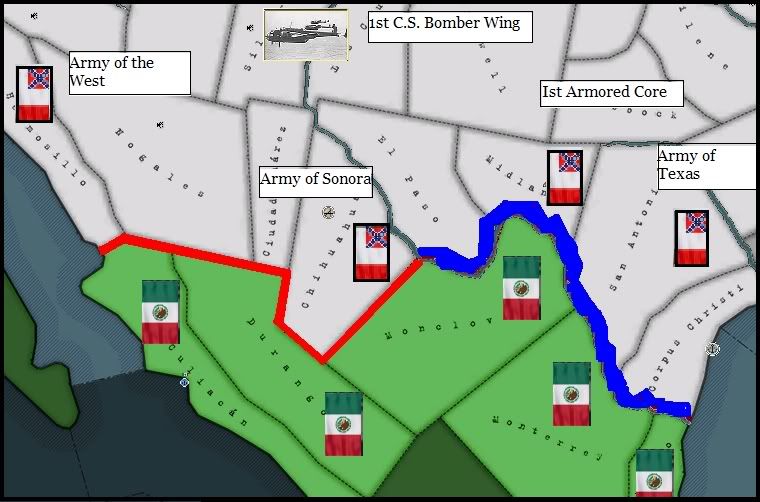
The situation at the start of the war, despite planning and preparation on behalf of Long and his military advisors, couldn’t be anymore uncertain. The natural border of the Rio Grand was considered a safe zone, (outlined in blue), most of the bank had been fortified and occupied by Confederate troops and armor, making any attack a sure failure, which left the other half of the border through Sonora and Chichuala the only (apparent) viable option for a successful attack (outlined in red).
The border became known as t he red zone and the blue zone, representing their believed safety level. The red zone was the only real vulnerable part of the defense, given the fact that it was occupied by the least amount of troops. None the less, Long didn’t believe that the Mexican Army was ready to pull off a full scale invasion of the Confederacy, despite Patton’s belief that Mexican Military leaders, such as General Valdez, were more daring than he believed.
This would be Long’s fault during the war, his interference with the preset plan’s. Patton and Nimitz had long prepared for the outbreak of war, and while Patton was in the position to strike, Nimitz was still preparing. Unwilling to allow the plan to be set amiss by the surprise attack, Long intervened and demanded a series of airborne strike’s to slow Mexican mobilization and to allow more time for the Patton-Nimitz offensive to be ready in full.
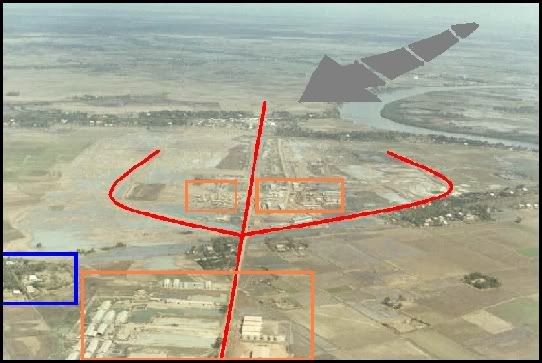
The first attacks would be made on Mexican military bases along the border. Long believed that the war could be won considerably easer if the Confederacy obtained and maintained complete air supremacy as early as possible, hence the movement of bombers and fighters out west before the outbreak of war.
Only a day after the declaration of war bombers and fighters set out on their mission’s, earning the Confederacy quick easy victories in the very beginning. Attacks such as the one above on Mexican air base’s obliterated what little air force the Mexican Empire had, leaving an open way to Mexico City….
*writers note* Sorry it came so late. I had it planned for yesterday, but there were so real life complications and a haunted house that stood in the way of it
The big gap between the armies of Sonora and the West seems quite disturbing to me...
So the dice are rolling, and the rubicon (or Rio Grande as may be appropriate) is crossed.
Retaliation
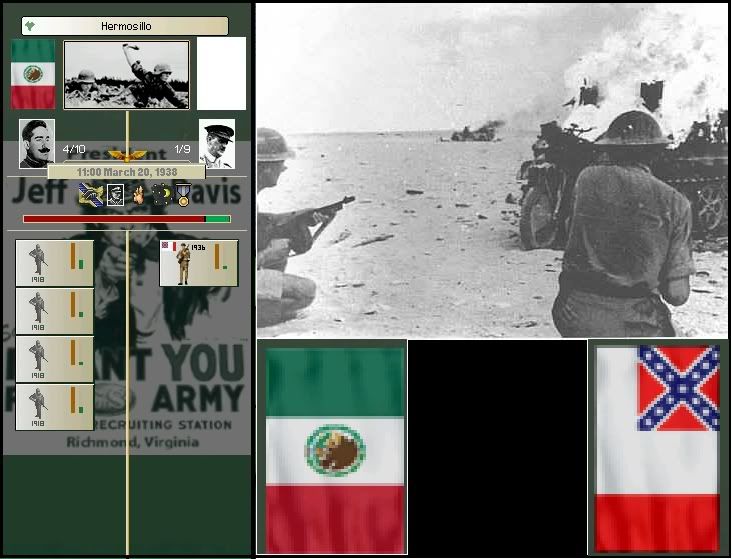
[British and Confederate Volunteer’s under attack in Hermosilio]
The bombing campaign initiated at the beginning of the war brought the Confederacy early success. The Mexican Air force, or what little it had, was effectively put out of commission and the empires in fracture in the north had been devastated. Strangely their was almost no initial retaliation; Long believed, perhaps a bit fool heartedly, that their attack had shocked the nation into initial inaction, giving the Confederacy a chance to end the war with a swift blow.
For twelve day’s after the war’s ‘start’ on March 18th there was little action aside from the bombings. Long wouldn’t allow an invasion to commence until the Mexican military attempted an invasion first, as a way of maintaining global sympathy as the one being attacked. Confederate troops peered over the Rio Grand and their posts at the ’red zone’ for over two weeks until the Mexican response finally came.
In the late night of March 19th a series of explosions ripped through the position’s taken up by General Knox’s Army of the West. The attack came in the form of a massive artillery bombardment, catching the soldier, who were awaiting reinforcements from Sequoyah, by complete surprise.
The attack came from two directs, over forty thousand Mexican soldiers advance from the south and west, crossing over from Mexican California. Initially, General Knox was determined to hold the line outside the city of Hermosilio, to avoid civilian casualties, but as his force of British volunteers and Confederate regulars began to be overwhelmed the troops were forced to retreat to inside the city, forcing a Mexican sympathy towards their ‘brothers’ in the city to the fore front and cessation of the bombardment.
None the less the position was hopeless, and the reinforcements coming from Sequoyah were unable to reach the men in time, forcing them to abandon their position.
False intelligence led military officers to conclude that an attack from Mexican California would have been unviable, given the difficulty to feed supplies to the detached peninsula and their nearly nonexistent navy. With partial lines broken in Sonora and the only force standing in the way of a Mexican invasion into Arizona on the run, a wave of fear swept the western states as reports of Mexican advances beginning towards Tucson began to spread like wildfire.
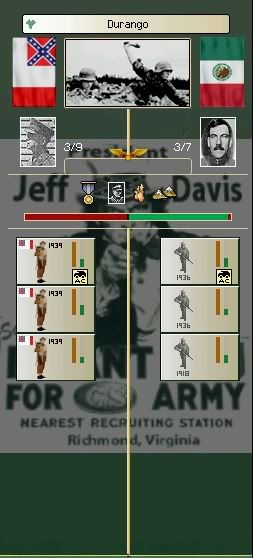
At almost the same time, as word reached Patton and the other officers at the border, a counter invasion was launched into the Mexican Province of Durango by the Army of Sonora. The attack was meant to, hopefully, divert Mexican force’s to prevent the invasion, lessening the attack on Hermosilio; It didn’t work. The attack would end up as much a disaster as the defense of Hermosilio. Mexican forces took refuge in the mountain’s, hiding in the caves and pre-made sub structures that ran through them.
Confederate troops were forced to assault a well dug in army who knew the land better than they could ever hope. While the force’s were evenly matched, the Mexican troops were able to easily out maneuver the army, appearing to be everywhere at once. Confusion quickly ensued along with a since of panic, coupled with the extreme heat doomed the assault almost as quick as it began.
After only a day of fighting the Army of Sonora took massive casualties and was forced to retreat in utter defeat. The opening of the war appeared to be a bad omen to Patton and many other, who turned on Long, blaming him for the initial failure’s and holding them back when it could have made a difference.
Admiral Nimitz would be Long’s ray of hope as the navy had taken the time it needed to prepare, shipping over thirty thousand Cuban allies to the front to guard against another possible invasion and arriving in the Gulf of Mexico combat ready.
The navy’s well preparation paid off as all supplies and resource shipments coming into the Mexican Empire were cut off completely, putting a stranglehold on Mexican military forces and civilians alike. Despite this success, the initial failures on land began to quickly sour the people’s respect for Long, who ensured them the war would be over quickly without much strike; The invasion of Confederate land, in Sonora and Arizona, didn’t help their outlook.
Long should learn that wars have uncertain outcomes. And a bloody victory can be just as bad as a defeat.

